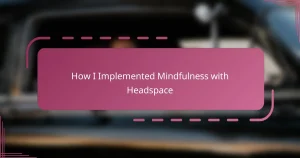Key takeaways
- Natural consequences help children learn accountability and the real impact of their choices, fostering problem-solving skills and emotional resilience.
- Dr. Laura Markham emphasizes connection and empathy in discipline, guiding children through their own experiences rather than imposing arbitrary punishments.
- Implementing natural consequences involves setting clear boundaries and discussing outcomes to promote understanding and trust between parents and children.
- Overcoming the urge to intervene during discomfort allows children to internalize lessons from their actions, leading to meaningful growth and responsibility.
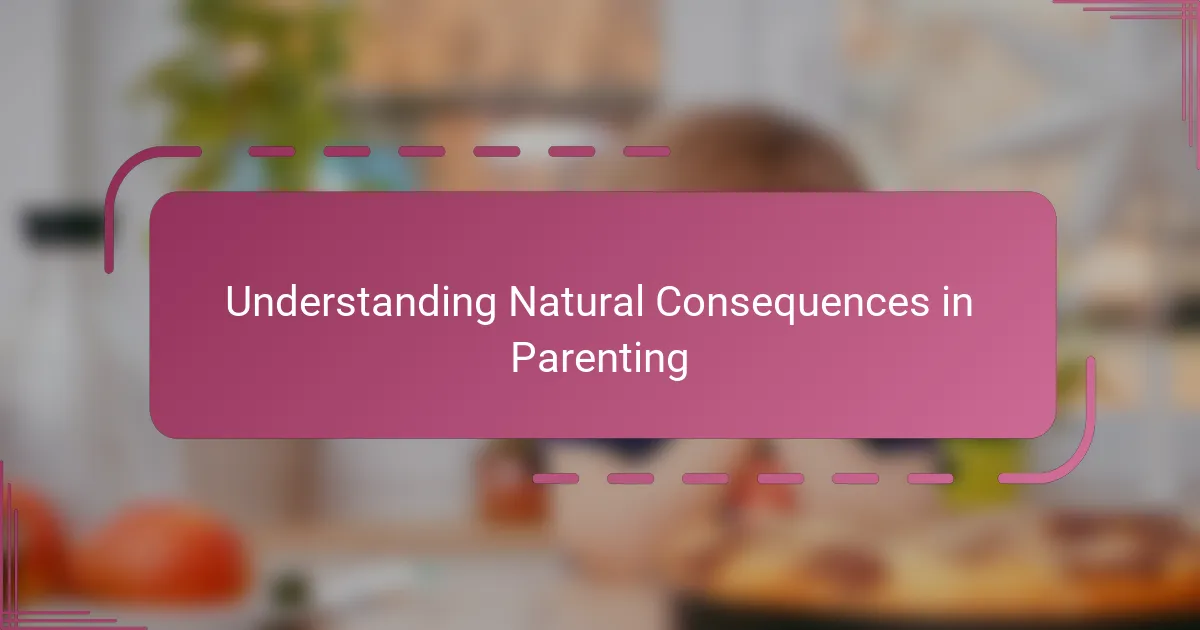
Understanding Natural Consequences in Parenting
Natural consequences in parenting mean letting children face the outcomes of their own actions instead of shielding them from every mistake. I remember when my son refused to wear his coat on a chilly day, and naturally felt cold; it was tough to watch him uncomfortable, but that experience taught him better than any lecture could. Have you noticed how these real-life lessons often stick longer and feel more meaningful to both parents and kids?
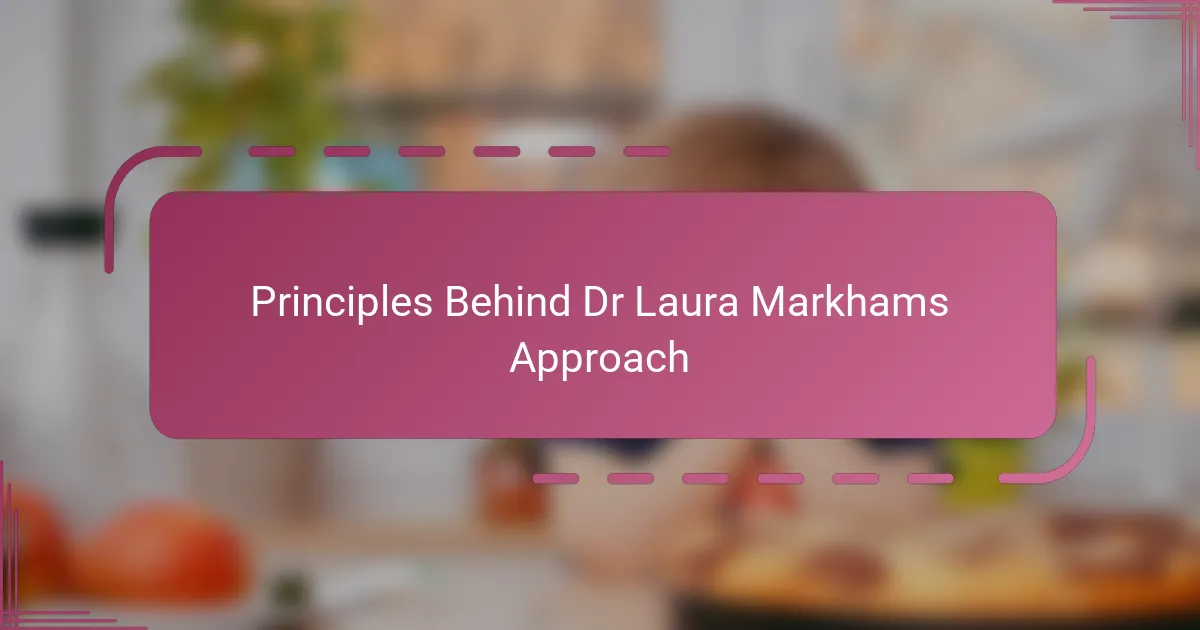
Principles Behind Dr Laura Markhams Approach
What I appreciate most about Dr. Laura Markham’s approach is her deep respect for a child’s emotional world. She emphasizes connection over control, reminding me that discipline isn’t about punishment but about guiding with empathy. Have you ever noticed how a calm, understanding response can defuse a situation far better than strict rules?
She also highlights the importance of teaching kids responsibility through natural consequences, rather than imposing arbitrary punishments. This principle reminded me of a time when I stepped back and let my daughter experience the result of forgetting her homework — it was uncomfortable for her, sure, but it sparked real reflection. Don’t those moments feel more empowering than simply enforcing consequences?
Lastly, Dr. Markham encourages parents to maintain their own composure and patience, recognizing that our reactions set the tone for our children’s learning. I’ve found that when I stay grounded, even challenging situations become opportunities for growth — not just for my child, but for me as a parent too. Isn’t that a relief, knowing we’re learning alongside them?
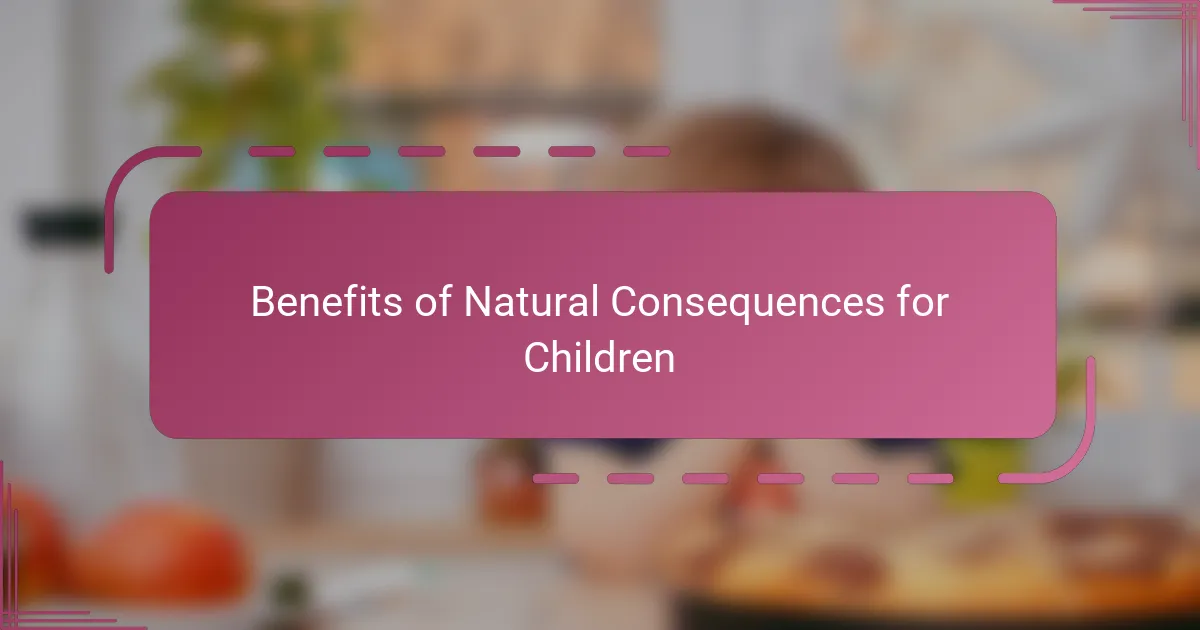
Benefits of Natural Consequences for Children
Natural consequences help children develop a sense of accountability because they directly connect actions with outcomes. I’ve noticed that when I let my son experience the natural results of his choices, he begins to think twice before acting impulsively. Does it make sense that real-life feedback feels more genuine than a made-up punishment?
One of the biggest benefits I’ve seen is how natural consequences build problem-solving skills. When my daughter realized she forgot her lunch and had to manage hunger until dinner, she brainstormed new ideas for next time. Isn’t it powerful to watch kids take ownership and become more resourceful through their own experiences?
Beyond responsibility and problem-solving, natural consequences nurture emotional resilience. I felt proud when my son, after feeling cold without his coat, said, “I’ll wear it tomorrow so I don’t get chilly again.” Those small moments of self-awareness remind me that children can learn patience and adaptability when we trust them to handle the outcomes. Have you ever witnessed your child grow stronger through a little discomfort?
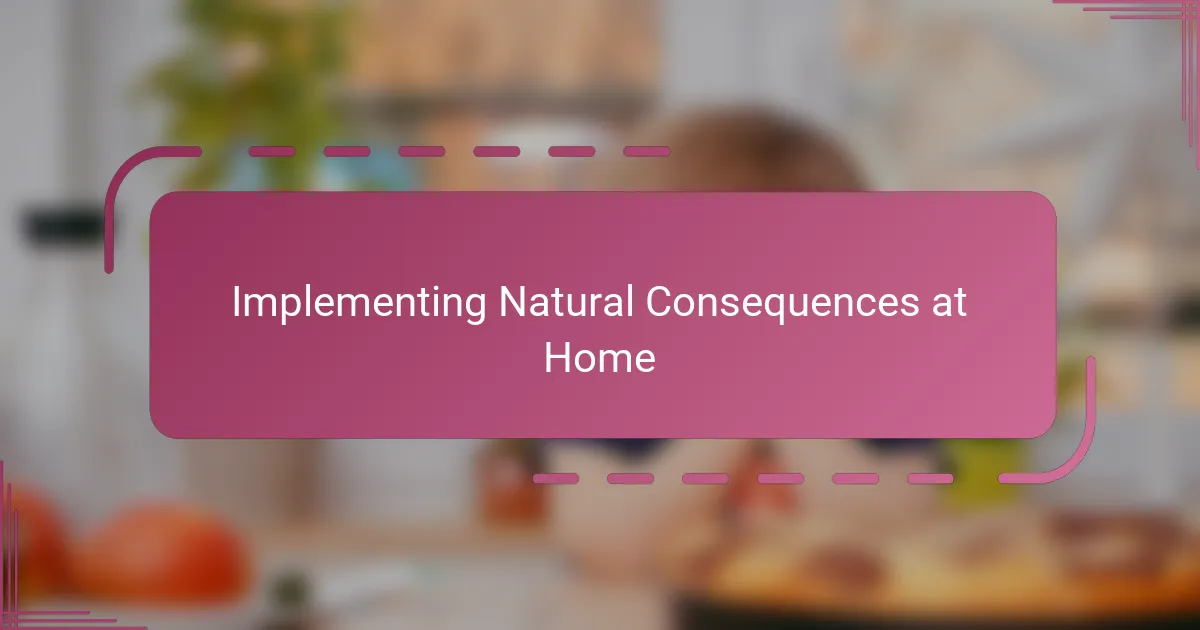
Implementing Natural Consequences at Home
Putting natural consequences into practice at home isn’t always easy, especially when our instinct is to protect our kids from discomfort. I remember the first time I let my daughter face the consequence of leaving her shoes outside in the rain — she was upset, yes, but she also learned to be more mindful without me saying a word. Have you tried stepping back like that and felt the mix of worry and pride?
One thing I’ve come to realize is that setting clear boundaries beforehand makes natural consequences feel fair and predictable. For instance, I told my son, “If your bike isn’t put away, it might get rusty.” When it did, he understood it wasn’t punishment but a natural outcome. Doesn’t that kind of consistency make lessons stick better than random reprimands?
I also found that discussing the outcome with my kids afterward turns natural consequences into valuable conversations. After my daughter managed her forgotten lunch, we talked about what worked and what she could try next time. It was more than discipline; it was problem-solving together — and that connection felt like a win for both of us. Have you noticed how these chats build trust and confidence?
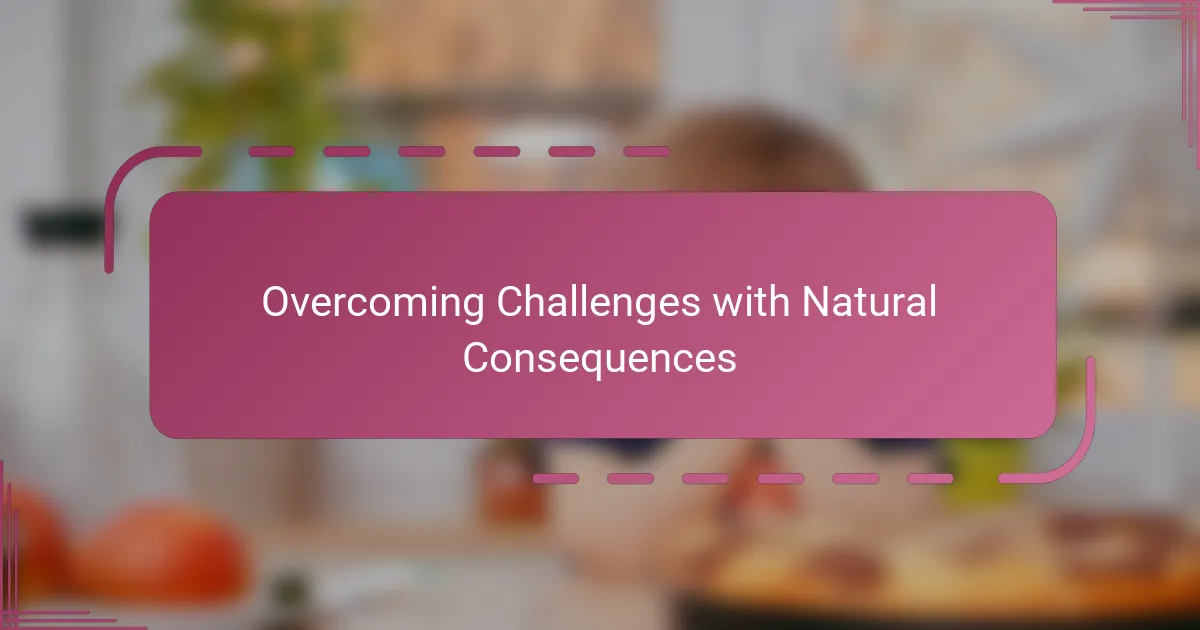
Overcoming Challenges with Natural Consequences
At times, allowing natural consequences can feel like a test of patience — I’ve caught myself wanting to jump in and fix things quickly when my child faces discomfort. But in those moments, stepping back felt like trusting them to handle challenges, even if it meant a few tears or frustration. Isn’t it interesting how those tough experiences often lead to the most meaningful growth?
I’ve also learned that consistency is key when overcoming the urge to rescue. Once, after my son’s bike got rusty from being left out, he owned the mistake instead of blaming anyone. That moment felt like a breakthrough, showing me that sticking to natural consequences helps kids internalize responsibility more than any lecture ever could. Have you noticed how children respond better when they see the direct link between action and result?
Sometimes, the biggest challenge is managing our own emotions as parents. Whenever I stayed calm through my daughter’s initial upset over a natural consequence, it opened space for empathy rather than conflict. Those times reinforced for me that maintaining composure is just as much a part of the lesson as the consequence itself. Isn’t it reassuring to realize that our own mindset shapes how our children handle setbacks?
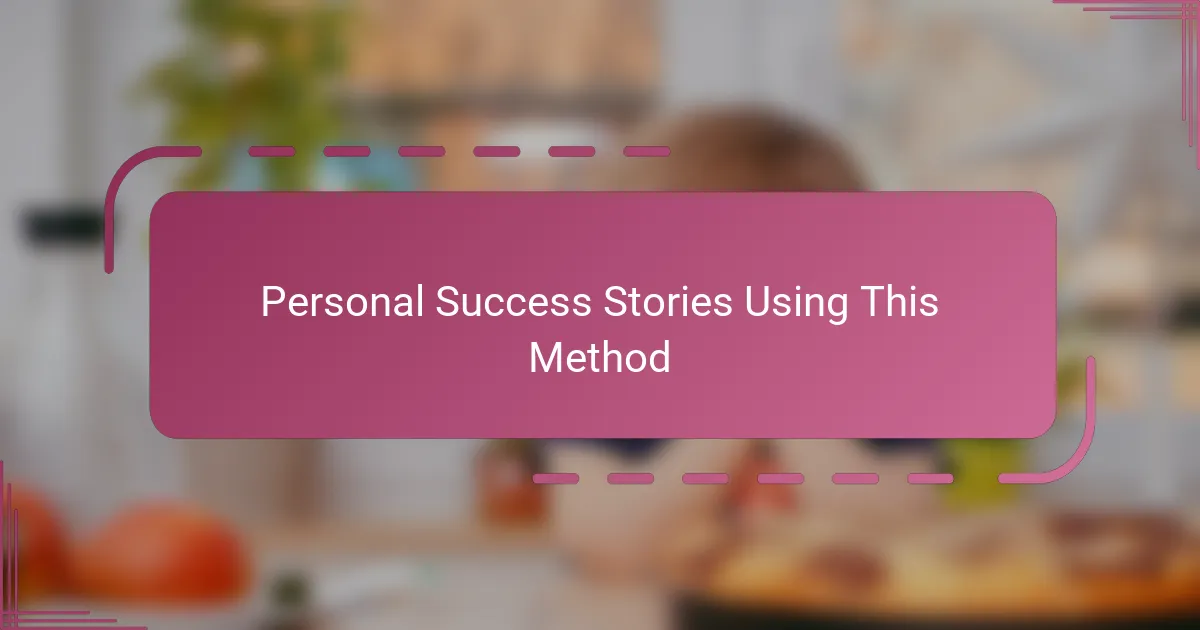
Personal Success Stories Using This Method
One of the most memorable successes I experienced with natural consequences was when my son left his art supplies all over the floor, and of course, some got broken. Instead of rushing to clean up, I waited to see how he would handle the mess. Watching him accept the responsibility and take initiative to organize his workspace afterward made me realize how powerful it is to let kids learn from their own choices. Haven’t you found that kids often surprise us when we give them that space?
Another moment that stands out was when my daughter forgot her permission slip for a school trip. At first, I felt tempted to “rescue” her by calling the teacher, but then I remembered Dr. Markham’s advice. Letting her face the consequence—missing the trip—was tough for both of us. Yet, that experience motivated her to develop better habits around preparation. Don’t you think sometimes a little disappointment teaches lessons that no lecture ever could?
I also recall the small but significant instance when my son wore his sneakers without socks despite my warning, and he came home with blisters. Instead of scolding, I calmly pointed out the natural outcome. Seeing him decide to put socks on the next day without me reminding him filled me with pride. Isn’t it amazing how natural consequences can turn everyday mistakes into lasting personal growth?
